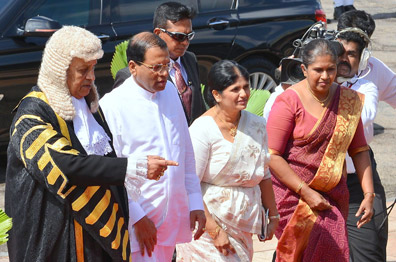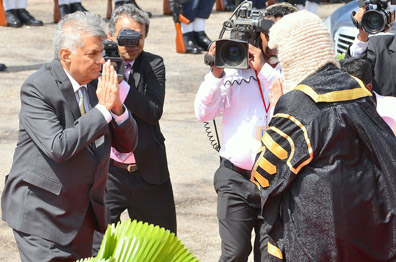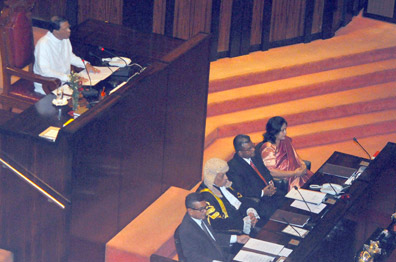|
Inaugural session of the 8th Parliament:
The beginning of a new political culture
by Uditha Kumarasinghe
The first session of the eighth Parliament convened on Tuesday
(September 1) has paved the way for a new political culture sans petty
political differences with the historic decision by the UNP and the SLFP
to form a national government and govern the country through consensus
for two years.
 |
| Speaker Karu
Jayasuriya accompanying President Maithripala Sirisena and
Jayanthi Siresena to the inaugral session of the Eighth
Parliament |
 |
| Prime
Minister Ranil Wickremesinghe being greeted by the Speaker on
arrival |
 |
| The President
inaugrates the Eighth Parliament |
The Government’s Policy Statement presented by President Maithripala
Sirisena at the inaugural session was a clear reflection to replace the
traditional culture of shifting power between two major contending
parties and forming a National Unity Government during his tenure.
President Maithripala Sirisena, in his address called upon all
parliamentarians to focus attention and find ways and means to reinforce
the on-going efforts to reach a consensus in keeping with the accord
signed between the two major parties.
The composition had many new faces from both major political parties,
the UNP and the UPFA as over 60 former parliamentarians including many
party heavyweights who contested the August 17 General Election failed
to enter Parliament. However, some defeated UPFA candidates got the
opportunity to re-enter Parliament through the UPFA National List. There
were clear divisions on the composition of the Government and Opposition
ranks, while the opposition ranks looked much stronger, with 95 UPFA
members, 16 TNA and 6 JVP members.
The UNP led with 106 members, government ranks comprised several
political parties, the Jathika Hela Urumaya (JHU), the Sri Lanka Muslim
Congress (SLMC), the All Ceylon Makkal Congress (ACMC), the National
Union of Workers (NUW) and the Democratic People’s Front (DPF) which
aligned with the United National Front for Good Governance (UNFGG) to
contest the August 17 General Election under the UNFGG banner.
The opposition benches were represented by the SLFP- led United
People’s Freedom Alliance (UPFA) which secured 95 seats along with its
constituent parties, National Freedom Front (NFF), Mahajana Eksath
Peramuna (MEP), Communist Party (CP), Democratic Left Front (DLF) and
Ceylon Workers’ Congress (CWC). Moreover, the Tamil National Alliance (TNA)
which obtained 16 seats and the Janatha Vimukthi Peramuna (JVP) which
secured six seats are also in the Opposition.
UNP Parliamentarian Karu Jayasuriya and UPFA Parliamentarian,
Thilanga Sumathipala were unanimously elected Speaker and Deputy Speaker
while TNA MP Selvam Adaikkalanathan was elected Deputy Chairman of
Committees.
Accompanied
MP Jayasuriya was accompanied to the Chair by Prime Minister Ranil
Wickremesinghe and SLFP Group Leader, Nimal Siripala de Silva.
Thereafter, all party leaders including Prime Minister, Ranil
Wickremesinghe extended their good wishes to the Speaker. Former
President and UPFA Kurunegala District MP, Mahinda Rajapaksa was also in
the Chamber at the inaugural session and was present when the House
resumed sittings at 3.00pm to deliver the government’s policy statement
by the President. He took a front row seat in the Opposition between
SLFP Group Leader, Nimal Siripala de Silva and MP Dr. Sarath Amunugama.
Government legislators expressed displeasure over the remarks by
Colombo District UPFA parliamentarian, Udaya Gammanpila who misused the
opportunity given to him to congratulate the Speaker.
Gammanpila’s remarks turned the House into an uproar when he said
that some of those who had taken up arms against the Security Forces in
the past, were now in Parliament and would attempt to use the
parliamentary forum to propagate their separatist ideologies.
Objection
Prime Minister, Ranil Wickremesinghe objected to some of the
derogatory remarks by MP Gammanpila.
The Premier pointed out that although Gammanpila was not a party
leader, he was given the opportunity to wish the Speaker and he should
not have abused this opportunity. Speaker Jayasuriya who gave his first
warning, called on the MP to confine his speech to a congratulatory
message.
Despite the UNP and SLFP having agreed to form a consensual
government, the appointment of TNA Leader, R. Sampanthan as Opposition
Leader created divisions in the UPFA as some of its coalition partners
expressed vehement opposition by giving it to the TNA.
NFF Leader and UPFA Colombo District parliamentarian, Wimal
Weerawansa who raised a point of order, drew the attention of the House
about a letter signed by 56 UPFA MPs which was handed over to UPFA
Leader, President Maithripala Sirisena requesting that MP Kumara Welgama
be appointed Opposition Leader and UPFA MP Mahindananda Aluthgamage as
Chief Opposition Whip.
The premier told rebel UPFA MPs that if they wished to challenge the
Speaker’s decision, they would have to bring a substantial motion and
added that those who made a big hue and cry in the Chamber should have
taken up the matter when they met the President in Polonnaruwa on
September 2. Later, MP Udaya Gammanpila told a media conference at the
Parliamentary complex that there were enough past experiences as to how
Amirthalingam capitalized that position to promote anti-Sri Lankan
activities and propagate Tamil nationalism.
Meanwhile, TNA party sources also confirmed that they had agreed to
JVP leader Anura Kumara Dissanayake being appointed Chief Opposition
Whip.
However, according to accepted procedure, the post of Chief
Opposition Whip should go to the party to which the Opposition Leader’s
post was held. Yet, the TNA decided to give that opportunity to the JVP.
The resolution moved by the Prime Minister seeking the approval of
the House to increase the number of Ministers from 30 to 48 was passed
in Parliament with a majority of 127 votes- 143 votes were in favour and
16 against, while 63 MPs were absent at the time of voting.
At the end of the debate, JVP leader, Dissanayake called for a
division by name. The vote was clear testimony of the division within
the UPFA, as a large number of UPFA MPs who took the lead in the ‘bring
back Mahinda’ campaign were absent at the time of voting. The UNP,
government coalition parties and a section of UPFA MPs voted for the
resolution. Sixteen UPFA parliamentarians along with five JVP MPs voted
against the resolution. Prior to the debate on the resolution, a
controversy broke out on the floor of the House due to a point of order
being raised by JVP leader, Anura Kumara Dissnayake who said that the
resolution moved by the Prime Minister was unconstitutional.
When the resolution was moved, the JVP and several other coalition
partners of the UPFA opposed it on several grounds. The JVP leader said
that according to the provisions of the 19th Amendment, a national
government meant a government comprising all parties in parliament.
Therefore, merely because a couple of parties enter into an agreement to
form a government, it could not be construed as a national government.
This led to both government and opposition members adducing various
arguments to consolidate their positions.MEP leader, Dinesh Gunawardena
said the SLFP was not represented in this Parliament and that it was the
UPFA. Hence he requested the Speaker to give a ruling on this matter.
Thereupon the Speaker suspended sittings for 10 minutes to deliver
his ruling. When the House resumed sittings, Speaker Jayasuriya told the
House that according to the provisions of the 19th Amendment, the party
which obtains the highest number of votes could form a national
government with other parties and that the resolution moved by the Prime
Minister was consistent with the Constitution and could be taken up for
debate.
Fair mandate
JVP National List MP, Sarath Mayadunne on Thursday (September 3)
resigned from his post after making a speech in Parliament. Mayadunne
told the House that the JVP had not received a fair mandate from the
people and voters should have sent more JVP members to Parliament as it
is the only party with politicians who have no corruption charges
against them and had not abused power.
However, voters did not do so. The election results are a clear
reflection that people considered corruption and other acts of
misconduct of the two major parties as trivial and voters had not
rejected those who swindled public funds and indulged in corruption. |

